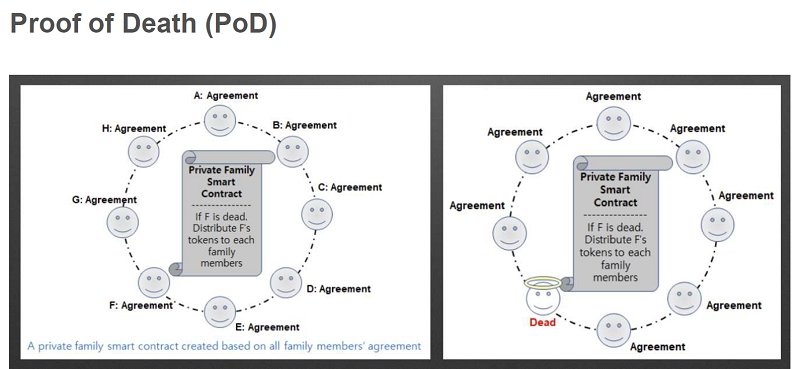3 Innovative Solutions For the Seamless Inheritance of Cryptocurrency Assets
Earlier this year, Futurism carried a story about Michael Moody, a 26-year old who died in a tragic plane crash in Chico, California in 2013. Before his death, Michael was a Bitcoin miner, in the words of Michael’s father, “my son was actually one of the earliest people to mine it. He used his computer at home to mine bitcoins when you actually could do it that way, and he had a few, we think.” Two years after the crash, the father started exploring ways to retrieve Michael’s cryptocurrency assets. He has succeeded in piecing together information about his son’s stash of Bitcoin, but he been unable to access his crypto wallets because of the decentralized nature of cryptocurrencies.
Nolan Bauerle, director of research at cryptocurrency analysis at CoinDesk in an interview with Bloomberg observed that “if someone who owns Bitcoin, or another cryptocurrency passes away without sharing their account information, those coins are simply abandoned.”
Interestingly, being able to retrieve personal information and access a cryptocurrency wallet doesn’t automatically mean that the funds of the deceased are available to their beneficiaries. A number of legal considerations such as the Computer Fraud and Abuse Act (“CFAA”) and The Stored Communications Act prohibit the unauthorized access to people online accounts (including crypto wallets) even when they are dead.
Now, accessing deceased cryptocurrency wallets and transferring funds without legal authorization apart from being a financial crime also has tax implications. Hence, dying without clear-cut instructions on the management of your digital assets means such assets could be forfeited to the state or lost forever. This piece examines three projects introducing innovative solutions for managing digital inheritances.
TrustVerse
TrustVerse is fundamentally a blockchain-powered AI platform that provides an optimized asset management service while also minimizing cryptocurrency volatility for low-risk medium-return performance ensured by its deep neural network and secure and reliable blockchain based system. Beyond intelligent asset management, TrustVerse also offers smart contract programming and design solution on its dApp to help cryptocurrency investors manage taxes, legacy planning, inheritance and transfer of digital assets.
With TrustVerse investors can manage their crypto assets, and make sure their family and loved ones will get access to your assets after they die thanks to Smart Contracts and oracle mechanism. TrustVerse helps investors protect their assets through private smart contracts stored on a public chain. The smart contracts are also programmed with life scheduling service that reaches out to your beneficiaries to when you’ve not checked in for a while.

TrustVerse also leverages a Proof of Death (PoD) consensus solution to prevent post-mortem identity theft and fraud. TrustVerse also has solutions to determine if your digital assets are required to be reported and submitted to probate. Once all statutory legal requirements are met, you can trust that the smart contract will execute and the transfer and distribution of digital assets to predefined designators will be done. The best part is that this platform manages other digital properties such as online storage accounts, websites, emails, photo , nd video sharing accounts, domain names, and intellectual property among others.
Safe Haven
Safe Haven is a platform that uses blockchain technology to help people safely and transparently share the keys to their assets with beneficiaries after their demise. Many people are worried about sharing their account information or keeping it in storage because of fears that the accounts could be compromised and that their funds could be stolen. Safe Haven is using a TFC Share Distribution Key, Trust Alliance, and Escrow protocol to encrypt the information about digital assets while sharing the keys as a puzzle.
Safe Haven allows users to protect their digital assets and ensure seamless inheritance without locking you out. The protocol distributes seeds/private keys/passphrases that provide access to an asset to between the initiator and their beneficiaries. However, the shares of the keys are distributed to give the initiator/parent control over their assets – the shares are also managed as a legally-binding document by a notary. In the event of the death of the initiation, the beneficiaries holding the other shares can present the necessary legal documents to the Trust Alliance System.
DigiPulse
DigiPulse is another platform that wants to make it easier to manage digital inheritances with a solution for storing and encrypting information on a blockchain. The encrypted information can only be accessed by prespecified recipients. DigiPulse is being developed around the notion that there’s technically no need to attorney service for the transfer of cryptocurrency assets in event of the demise of the investor.
DigiPulse adds an interesting feature into the mix in that it allows users to choose between keeping their identity anonymous and allowing their identities to be visible. DigiPulse, however, doesn’t seem to require beneficiaries to take any action before the inheritable assets can be transferred to them. DigiPulse uses its API integrations to measure activity signals. Once a pre-defined period of inactivity elapses, the smart contract will assume that you’ve passed on and the smart contract will execute to transfer the assets to your beneficiaries.
This article was originally posted on FX Empire

 Yahoo Finance
Yahoo Finance 